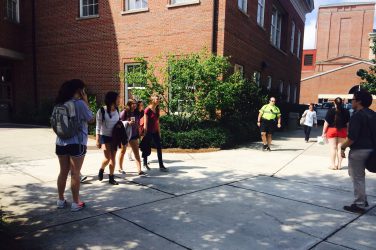There are two holidays in which Christian churches can count on peak engagement—Easter and Christmas. But this year, due to imposed social-distancing measures, church buildings across Georgia remained empty.
Athens-area churches have adapted, using online services to engage remotely. Although they are thankful to meet, conducting services and congressional communication from a distance creates new challenges as church leaders work to connect with their congregations.
Joel Shinpoch, communications pastor for Watkinsville First Baptist (WFB), said his role eased the transition to online services for his church.
“[The transition] wasn’t necessarily difficult for us. We just kind of had to pivot from some of the ways we would normally do things,” Shinpoch said. “It wasn’t difficult, but it’s not our preference.”
Why It’s Newsworthy: People often cope with trauma through religion, and due to social-distancing measures, churches across the country have had to adapt their services and communication strategies to connect with their audiences virtually. Easter is an important holiday for Christians and celebrating from home challenged church leaders to provide a sense of normalcy despite any difficulties associated with moving online and maintaining communication.
While WFB previously operated online with their website and social media, it did not post online services until that became a necessity for their worship. The church recorded the aspects of a normal Sunday service—worship, music and teachings from the pastor—in an empty room. To keep the audience engaged, the speakers asked viewers to send in drawings or pictures to be posted on the WFB Instagram story, according to Shinpoch.
WFB currently posts their hour-long services on their website and on YouTube. Their Easter sermon had the most views with more than 2,000. The other online services range from more than 900 views to more than 1,500. WFB said it has seen increased viewership with the transition online.
“Church is built on a lot of people being together and hugging and being close to each other, and that presents a challenge when you’re trying to get together to celebrate such an important day,” Shinpoch said. “But, we make the most of it because ultimately, you don’t have to be in a building to worship Jesus.”
*Note: The audio story subject is a friend of the writer.*
Creating a Sense of Community
Athens First United Methodist Church (AFUMC) also adapted their usual Sunday services to adjust for social-distancing measures. A link to a livestream worship service goes live every Sunday at 11 a.m., and their past services are available in an archive on the website. The AFUMC website also contains links to devotional materials and worship playlists for different age groups.
AFUMC already offered online services as an option for parents who needed to stay home with a sick child or were homebound and still had the technology, according to Martha Aenchbacher, AFUMC minister of congregational care.
But, their “Holy Week” celebrations were affected by the shelter-in-place. AFUMC chose to replay their 2019 Palm Sunday service prior to the live 11 a.m. service on the morning of Palm Sunday, so viewers could have a sense of “communal celebration.” The church also replayed the 2019 Good Friday service when this year’s service would have been held. On Easter Sunday, the 2019 Easter service played on the AFUMC website at 9:30 a.m., and at 11 a.m. the 2020 Easter service began live.
“One of the things that I appreciated most about seeing last year was seeing all the faces—seeing all the people that we love and miss,” Aenchbacher said.
Innovating Solutions
WFB, AFUMC and First Presbyterian Church of Athens all had to be creative to stay in contact with their congregations. Church leaders are using phone calls to keep in touch with members and Zoom to maintain group meetings.
Starting next month, First Presbyterian Church of Athens will be remotely celebrating communion.
“Of course we are all in homes, so it’s BYO—bread and cup. Bring your own communion,” said associate pastor Carol Strickland. “Whatever bread or juice or wine or whatever you happen to have on hand.”
Updating the System
First Presbyterian Church of Athens is hosting “real time” services on Facebook Live and posting additional materials and the livestream on their website’s sermon archive afterward. But, the church is working to upgrade their current system. According to Jack Palmer, husband of associate pastor Carol Strickland, First Presbyterian Church of Athens began experimentally streaming services last summer. However, as online services became a necessity, technological issues led the church to invest in an upgrade—purchasing a new camera, improving sound quality and increasing bandwidth.
“It’s just problems, and you just sort of have to work through them one by one,” Palmer said. “Eventually, we’ll get to where you will be pleased with it, but Rome wasn’t built in a day.”
According to Palmer, streaming equipment is currently in short supply as many churches rush to buy the necessities to transition online.
“We’re essentially setting up a whole studio system,” Palmer said. “We just don’t want to buy things twice. We just want to buy it once and use it to our best intention.”
Strickland said she is thankful the church has the means to update, but misses in-person services.
“We have a great music program and the quality of the sound you know, on this Facebook Live is just not the same as when you’re in there and there’s this magnificent organ and great choir,” Strickland said.
Maintaining Communication
According to Aenchbacher, under direction of the AFUMC senior minister Chuck Hodges, AFUMC is putting extra emphasis on “continued and effective” communication.
Aenchbacher said she has a group she prays with every Friday, and “several of them are not technologically minded or interested” so with the transition online, they “diligently and effectively” text each other instead.
“I’m amazed at how marvelous that experience remains, even though we would all prefer to be in the same room,” Aenchbacher said.
Aenchbacher said she was “keenly aware” of individuals who did not have access to the technology necessary to participate in online services. In order to solve this, she called these individuals and propped her phone next to her iPad, so they could hear the service.
She said most people already had the means to join, but she connected those who didn’t with others that were willing to help.
Staying Connected
According to Strickland, Zoom meetings create a “disconnect” between your mind and body because your mind says you’re connected, but you’re not physically there.
Even so, Strickland is just glad that her church has a means to continue to meet and hold services.
“[I look forward to] actually seeing people and being able to shake their hand or give them a hug. We talk a lot about being present with one another, and I think to be present, physically, is important, if we can be,” Strickland said.
Victoria Swyers is a senior majoring in both journalism in the Grady College of Journalism and Mass Communication and ecology in the Odum School of Ecology at the University of Georgia.







Show Comments (0)